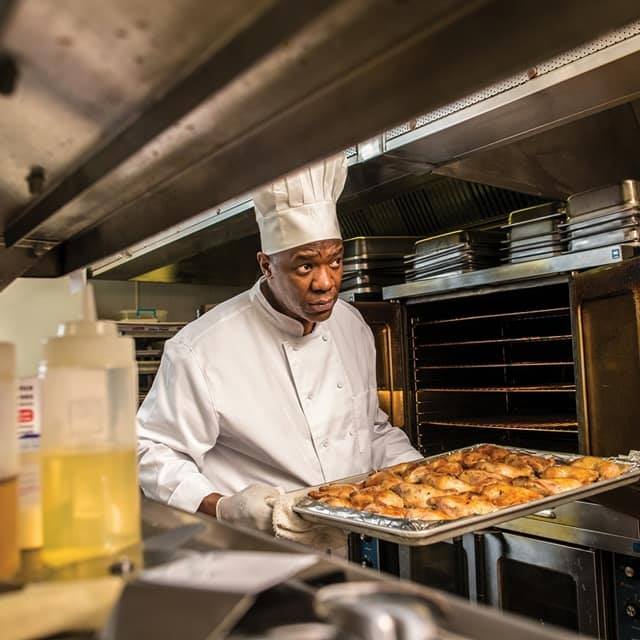Coach Byron Boudreaux Finds It Takes a Team to Survive an Aortic Aneurysm
8/30/2019
Acute Inpatient Rehabilitation Unit plays key role
 Coach Byron Boudreaux is a competitor, having played college sports and coached college athletes for more than 20 years. But it took all he had – plus the skills of a great team at Northwest Medical Center-Springdale – to beat a condition that kills many people who have it.
Coach Byron Boudreaux is a competitor, having played college sports and coached college athletes for more than 20 years. But it took all he had – plus the skills of a great team at Northwest Medical Center-Springdale – to beat a condition that kills many people who have it.
It was the evening of January 6 when Coach noticed he wasn’t feeling well.
“I’d never been really sick before and this was a feeling I’ve never had. My entire face was numb – like if you’d been sitting on your hand and it went to sleep. My cheekbones hurt. And my chest felt like an elephant was sitting on it. There was also some numbness in my hands… it was all in my upper body. I played college athletics and I have a nursing degree so I knew my body, and knew something wasn’t right.”
“My girlfriend asked if I was okay. She asked if I was having a heart attack. And I said and did the ‘typical man thing’… I said ‘wait just a minute.’ I went to the garage and took a shot of whiskey and smoked half a cigarette then told her to call 9-1-1.”
Because Coach Boudreax’s EKG was abnormal, EMS took him to the Emergency Department at Northwest Medical Center-Springdale.
The initial testing did not show a heart attack, as was initially suspected, but cardiologist Dr. Ahmad Elesber decided to run one more test. That’s when he saw the aneurysm in Coach Boudreaux’s aorta. Aortic aneurysms often have no symptoms at first; in fact, many are first discovered during an examination for another condition. If the aneurysm continues to expand, it can rupture, which is the most serious risk since a ruptured aortic aneurysm can cause life-threatening internal bleeding and/or a stroke.
“That’s when Dr. Redmond came to see me and explained what was going on,” Coach said. “He was telling me how serious this was.” Clyde Redmond, MD, is a cardiovascular and thoracic surgeon with more than two decades of experience.
“The first question I asked him was, how many of these do you do a year. When he said, on average, about six to eight a year, I asked why so few. And he said that it was because most people with aortic aneurysms are usually not diagnosed in time and die before they get to the operating table. Then I looked him in the eye and said, are you any good. And he said ‘yeah, I’m real good’.”
Coach had surgery within hours of the diagnosis with Dr. Redmond repairing the aneurysm. He was then in the ICU for more than a week.
Having survived the aortic aneurysm, Coach Boudreaux found that the hard work really begins after surgery. He chose to continue his recovery in the acute care inpatient rehab unit at Northwest Medical Center-Springdale.
Coach’s motor and cognitive skills had been impacted by the aneurysm and long recovery required by his life-saving surgery.
““When I went into the rehab unit, I didn’t have my memory or ability to do things you do every day, like go to the bathroom or take a shower.”
He describes the intensive rehab services as life-changing. “All the services are right there. Immediate medical attention is at your fingertips. I had three different types of therapists work with me every day (to improve my memory, movement and PT to get stronger).”
“They didn’t allow me to feel sorry for myself. The way they cared, I could tell it was more than doing a job. They were really into the people. I saw amputees and heart patients and all kind of people in the rehab unit. It was a beautiful thing.”
“Their attention to detail and professionalism made it an all-around good experience. They said some tough things to me but they were honest about how hard the recovery process is. I’m my own worst enemy, always pushing the boundaries. But they allowed me to push the limits within the medical parameters I was dealing with. For example, the first time I took a shower, they wanted me to sit down but I wanted to stand up. My therapist said that was okay but that he would have to ‘spot me’.”
Coach says it’s all about the people.
“It’s the people behind the scenes, in the trenches, that make the biggest difference. … Those who were assigned to work with me were the biggest motivation behind why I got better and why the process worked for me.”
For more than 20 years, Coach Boudreaux coached basketball at the University of Washington, then moved to Northwest Arkansas to coach with the Razorbacks. Currently, he oversees catering at Tyson headquarters, and also continues to train youth in basketball and do motivational speaking, working with challenged youth. Says Boudreaux, “I try to give back as much as I can.”
“I will be on medicine for the rest of my life – blood thinners and blood pressure medicine – to assist in healing and with my future health as well as to continue to strengthen my body. But I’m not going to sit down and feel sorry for myself. My goal is to get better every day. I will never be the same again but I will be better than before. I’m so fortunate, it’s crazy.”
Back